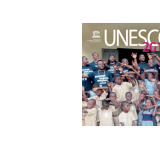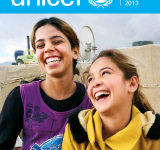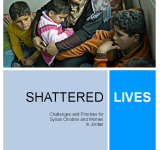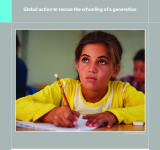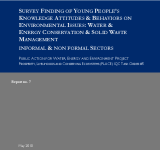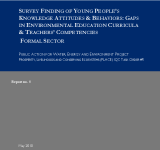learning
يناقش تقرير منظمة الأمم المتحدة للتربية والعلم والثقافة (اليونسكو) السنوي لعام 213 التحول الحاسم لليونسكو، عندما تبنت المنظمة نهجاً استراتيجياً جديداً في الدورة السابعة والثلاثين للأمانة العامة يركز
يعرض تقرير منظمة الأمم المتحدة للأطفال (اليونيسف) لعام 213 جهود المنظمة في الوصول إلى فئات الأطفال حول العالم التي لم يتم تغطيتها في السابق، وجهودها في خلق التغيير لفئات الأطفال الأكثر استضعافاً
The UNICEF Syria Crisis is a series of bi-weekly report that provides a summary of the humanitarian situation in Syria and development of the organization’s projects in the regions including Syria;; Lebanon;; Jordan;; Iraq;; Turkey and Egypt. The report contains an overview to the changing situations and humanitarian needs of the crisis. It focuses on the results and progress of the UNICEF projects in partnership with other local agencies in each country. These projects aim to ensure sustained access to safe water and sanitation;; provide psychosocial support;; vaccination and school supplies for children and support camps and host community schools for increased school enrollment. Relevant figures that summarize and evaluate the development of ongoing programmes can also be found in the report.
With an executive summary on the Syrian refugees situation in Jordan;; the report combines the conclusions of detailed assessments in various areas including as child protection and gender-based violence;; education;; water sanitation and hygiene;; and nutrition and health. It provides a holistic picture of the situation faced by Syrian children and women in Jordan to draw out recommendations for necessary plans of action. Some key findings of the report include growing challenges for water;; sanitation and hygiene situation in Za’atari camp;; several threats to the nutritional status and health of Syrian girls;; boys and women and increasing violence against adolescents. Bringing together the voices of children and women at the camps;; the report examines the situations of Syrian refugees in host communities and refugee camps and finds key recommendations based on them.
The report assesses the practical challenges of education and schooling for the Syrian children in refugee camps in Jordan;; Lebanon and Egypt as the Syrian Crisis prolongs. It argues that ensuring the continued access to learning is an essential platform for protection;; social stabilization and economic recovery that the international community should not ignore. The report also includes important figures and statistics revealing the alarming situation of education and school. Some of the key statistics are the host-country school-age children compared to Syrian school-age children;; Syrian children enrolled in public schools in Lebanon and Jordan and school-age Syrian refugee children in and out of school by countries such as Iraq;; Egypt;; Turkey;; Jordan and Lebanon. The report concludes with four key recommendations to be undertaken by regional governments and their international partners so that the fundamental right to quality education can be guaranteed to the Syrian children.
The report explores the level of knowledge;; attitudes held and practices observed by young people towards environmental issues related to water and energy conservation and sold waste management. It maps out available resources;; programs and learning opportunities in the informal and non-formal education sectors;; through which positive environmental attitudes can be encouraged and promoted. The survey of the report assess the knowledge;; attitudes and practices of young people aged 7 -24;; educations;; staff and youth workers to identify strengths and areas for improvement through capacity building and explore existing resources;; programs to evaluate their effectiveness. This research was conducted as part of the Public Action for Water;; Energy and Environment Project (PAP);; which aims to encourage water and energy conservation and to support behavior change towards more conservation and efficient practices both at the household level and in the commercial;; industrial and civil society arenas using social marketing behavioral methods. The study concludes that there is a need for more “green” programs that involve youth in a proactive way and therefore;; it recommends that programs targeting youth need to remain positive;; dynamic and in context. The recommendations of the report include development of environmental resources in the Arabic language;; the youth-led;; peer-led programs that involve participatory learning opportunities;; and social media tools to raise interests;; awareness and creation of environmental education task force.
The report aims to learn about young people's knowledge;; attitudes;; and behaviors with regards to water conservation;; energy conservation;; and waste management;; and it assess these against the learning objectives of the curriculum. It discovers that students' knowledge was sufficient and at times more sophisticated than that founded in the curriculum even though their attitudes and behaviors remain largely unchanged. The object of the survey pertains to the objectives of the Public Action for Water;; Energy;; and Environment Project;; which revolve around education for young people;; teachers and youth leaders to develop their knowledge and ethical values and attitudes. The survey focuses on assessing young people and educator's current awareness of water and energy resources and waste reduction and evaluating formal curriculum resources. The report points at the gap of translating young people's knowledge into genuine interest;; concern and action and proposes set of targeted actions including development of relevant resources and additional supplemental materials;; age-relevant projects to support environmental concepts in the national curriculum and assignment of environmental coordinator at all schools.
